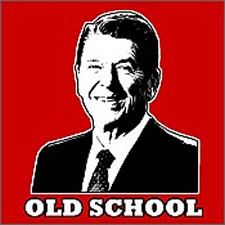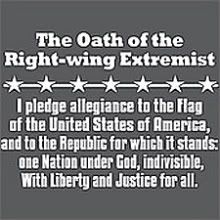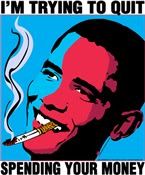Anyone who knows about Congressman Ron Paul of Texas, or about the Libertarian political philosophy, knows that according to the tenets of Libertarian thought, government's role in the lives of the people it's charged with governing is to be minimal. Basically, depending upon the source, Libertarian thought states that for the most part, people should be free to act as they please, as long as those actions to no physical harm to others. The government that "governs least, governs best".
For instance, Libertarians believe that there should be no laws regarding the use of drugs by individuals. What someone chooses to put into his or her own body should not be government's concern, even if it is harmful to the person. But as soon as that person, say, takes to the road in a motor vehicle, putting others at risk, then the use of the police force and court system to take that person off the road is fine and dandy.
In a nutshell, the right of a person to swing his fists around him or herself stops at the point those fists contact another person's face. Take any political decision and apply this litmus test, and you can easily judge what the Libertarian thought will be on the matter.
Libertarians are also "free marketers" to what might be called an "extreme". Government should have no place in the regulation of the marketplace or workplace. Everything involved with the production and selling of goods and services should be pretty much left up to the folks involved. If a product is shoddy, eventually no one will buy it, and the company making it will either improve the product or go out of business. If an employer runs an unsafe workplace, word gets around, and people will neither want to work for that employer, nor purchase it's products, thus, either the employer will change, or again, go out of business.
One noted Libertarian radio talk show host, Niel Boortz, has even gone so far as to say there should be no government regulation, nor licensing, of those who practice medicine.
As someone who also believes that a mostly unregulated free market is the best and most stable way to run an economy, I myself question the use to government force to modify natural balances which occur in the production of goods and services. Our agricultural system has been operating under strict, government imposed price and production controls for the better part of a century, for instance, and all it's done is run the family farmer out of business, consolidate the production of foodstuffs into the hands of large, multi-national corporations, and the market prices of agricultural products still suffer from wild swings due to worldwide supply and demand. The only difference is that farmers and ranchers are forbidden to do much about it here in the United States, while other nations can quickly adapt to market conditions. U.S. farmers and ranchers are thus put at an unfair disadvantage. In other words, all of the government controls upon agriculture have simply not worked.
It should come as neither surprising, nor should it be controversial, that Rand Paul has made statements concerning the Civil Rights Act of 1964 which indicate that he wouldn't support such a measure if it were to come before Congress today. Pretty much any Libertarian of whom I'm aware feels the same way, and there are writings of Libertarian thinkers going back to the very beginning of Libertarianism which document that belief. There is nothing new here. Libertarians believe that government has no business using it's force to determine the hiring practices of private business. It's the right of the employer to hire or fire anyone the employer wants to, for whatever reason the employer chooses.
Is racism abhorrent? It certainly is. Does racism exist? It certainly does. Is everyone who doesn't support government intervention in issues involving race a racist? Absolutely not. Can government regulate what is in man's heart? No. If a person is going to hold racist personal beliefs, the best the government can do is to regulate the outward appearance of that person, by regulating his or her actions. Government has had very little success in changing the inner workings of man.
Just as Lyndon Johnson's "Great Society" of the 1960's engaged the Federal government in an "all-out war" against poverty, and poverty rates have remained for the most part unchanged for 40 years, there is really no evidence that the actions of government have had any effect on what man truly believes about his or her fellow man based on race.
Just because someone doesn't believe the government should have the right to forcefully determine the hiring practices of private business, doesn't make him or her racist. To date, not a single shred of evidence has come to light to indicate Rand Paul has racist bone in his body, nor that he's ever made a personal decision in his life that took race into account.. The current controversy involving Rand Paul's statements is merely political fodder being used by the left in it's continuing attempts to brand the TEA Party movement as a racist movement. Apparently, we're supposed to just ignore all the blacks, Hispanics, Asians, middle-easterners, Jews, and young people in TEA Party crowds, not to mention all the blacks, Hispanics, Asians, middle-easterners, Jews, and young people who speak at TEA Party events.
Don't fall for the distraction. The TEA Party movement is about getting government OUT of the hands of career politicians and bureaucrats who have become fat, lazy, and uncaring about our personal freedoms, and about getting government back INTO the hands of people who will quickly respond to the will of the public at large, who will take our personal freedoms into account. It's about returning government to it's constitutionally limited "roots", and getting government out of our pocketbooks.
Leftists are desperate, and running scared. As practitioners of "situation ethics" they will use any tactic, no matter how vile, in order to attempt to hold onto their power over us.
















No comments:
Post a Comment